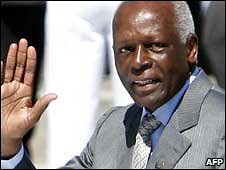
Republic of Angola President Jose Eduardo dos Santos. The southern African state has changed its constitution to have the president elected by parliament as opposed to a direct vote. The oil-rich nation is the largest exporter of oil on the continent.
Originally uploaded by Pan-African News Wire File Photos
Angola's parliament has approved a new constitution which abolishes direct presidential elections.
The head of state will now automatically be the leader of the party with the parliamentary majority.
The main opposition, Unita, boycotted the vote, accusing the government of trying to destroy democracy.
President Jose Eduardo dos Santos has been in power for more than three decades and the next polls are not expected until 2012.
The oil-rich nation is recovering from a long civil war which ended in 2002.
--------------------------------------------------------------------------
JOSE EDUARDO DOS SANTOS
In power since 1979 - Africa's second-longest serving leader
Joined the MPLA's guerrilla army at the age of 19
Trained in oil engineering and radar technology in the former Soviet Union
----------------------------------------------------------------------------
The change was approved by 186 out of the 220 members of parliament, and drew loud applause and chants of "Angola, Angola!" from MPs in chamber, AFP news agency reports.
The BBC's Louise Redvers in the capital, Luanda, says under the new constitution, a president can only serve two five-year terms but he would start from scratch in 2012, meaning Mr dos Santos could remain in office until 2022.
Our reporter says the vote on the new constitution had been expected in March.
Angola is currently hosting the Africa Cup of Nations football tournament and some say the government deliberately rushed through the vote in a bid to avoid wider public debate, she reports.
The new constitution also abolishes the role of prime minister, allowing the president to chose his own deputy to take on that role.
The extension of the president's powers has come in for criticism.
"The ruling MPLA says the constitution will increase democracy, but by abolishing the presidential ballot and concentrating all the power on the president it will do exactly the opposite," political analyst Fernando Macedo told Reuters news agency.
Story from BBC NEWS:
http://news.bbc.co.uk/go/pr/fr/-/2/hi/africa/8472127.stm
Published: 2010/01/21 13:05:44 GMT
No comments:
Post a Comment